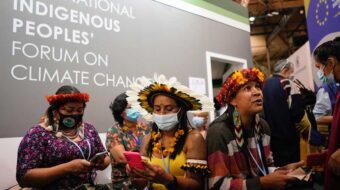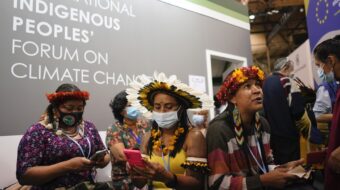
In the United States, the human suffering and death during the COVID-19 pandemic demonstrate the harsh consequences that can occur when science is disregarded and responses to existing evidence are delayed, ineffective, and inequitable—or altogether absent. Importantly, the toll of the pandemic should be seen as a forewarning of the future; there will be far-reaching and accelerated health consequences of climate change if the U.S. fails to appropriately respond to the current evidence. Globally, greenhouse gas (GHG) emissions must be reduced by almost half over the next decade to keep global temperature rise to “well below 2°C”, requiring a 7.6% reduction in GHG emissions every year.
The U.S. also faces a long-overdue reckoning for centuries of systemic racism, which continues to drive many health inequities and injustices. Climate change exacerbates the health consequences of both the COVID-19 pandemic and systemic racism, especially against the backdrop of a neglected public health system. Climate change action, perhaps now more than ever, is a critical component for achieving optimal health and health equity in the U.S.
The effects of climate change worldwide and in the U.S. are undeniable and worsening, with wide-ranging impacts on health and the economy. Globally, the six warmest years in recorded history occurred between 2014-2019, with 2019 the second warmest. In the U.S., states like Alaska, Georgia, and North Carolina had record high temperatures in 2019.
In 2019, older persons, or individuals over the age of 65, experienced over 102 million more days of heatwave exposure in the U.S. compared with the 1986-2005 baseline. Eight out of the ten highest-ranking years of heatwave exposure among older adults, a population especially vulnerable to heat, have occurred since 2010 in the U.S. In the past two decades, heat-related mortality for older persons has almost doubled, reaching a record high of 19,000 deaths in 2018.
The U.S. saw a total of 2 billion potential hours of labor lost due to extreme heat across the service, manufacturing, agricultural, and construction sectors in 2019 (with 540 million potential hours lost in construction alone), placing the 2015-2019 average 63% higher than the 1990-1994 average. A conservative estimated total of $45 billion dollars of potential earnings were lost across these four sectors in 2015.
Climate change alters rainfall patterns and intensifies extreme weather events. In 2019, the U.S. had its second wettest year on record with many Midwestern and Central states logging unprecedented levels of rainfall. Fourteen weather and climate disasters in 2019 each caused damage of at least one billion dollars, not including health-related costs, and most of these events struck the Central states. Three flooding events along the Missouri, Mississippi, and Arkansas Rivers totaled over $20 billion in damages. These disasters had widespread health effects and may have exacerbated food insecurity.
Climate change, through drier weather and higher temperatures, can also increase the likelihood of wildfire events, as has been repeatedly exhibited in Western states. Individuals in the U.S. experienced 1.85 billion more person-days (one person experiencing one day) of exposure to high wildfire risk in 2016-2019 compared to 2001-2004, which is a 19% increase. Wildfires generate dangerous particulate air pollution, with local and long-range health impacts, and have contributed to a decline in U.S. air quality since 2016.
While extreme weather events garner media attention, climate change has ripple effects on health in the U.S. that are often less obvious, such as worsening pollen levels, mental health, water-borne diseases (e.g., Vibrio), and human migration and displacement. As the health harms and urgency grow, U.S. health professionals and researchers are engaging at the intersection of climate change and health like never before, as exemplified by a nearly eight-fold increase in research publications on climate change and health between 2007 and 2019.
This fourth annual U.S. Policy Brief, supported by 70 institutions, organizations, and centers, uses data from the 2020 global Lancet Countdown report and supplemental sources to highlight the opportunities in the U.S. to respond to these threats. No one is immune to these health risks. While time is running out, there is still an opportunity for decisive action to lessen the severity of climate change impacts by prioritizing a healthy future for all.
RECOMMENDATIONS
- The U.S. should rapidly and urgently implement the following recommendations in an equitable and just fashion so that every person can live with dignity and in good health.
- Transition to healthy, sustainable agricultural practices: Implement agriculture policies and invest in programs that can foster improved health from a reduction in particulate air pollution and GHG emissions, such as reducing the need for nitrogen fertilizers.
- Remove U.S. fossil fuels subsidies: Eliminate fossil fuel subsidies and reduce investments in new fossil fuel exploration and production.
Shift to zero-carbon electricity: Urgently transition to zero-carbon electricity generation by 2035 that is affordable for all. - Increase access to healthy transport options: Rapidly invest in enhanced active transport infrastructure and affordable, accessible zero-carbon public transportation, electric vehicles, and charging stations.
- Increase and sustain investments in public health to protect against the accelerating health threats of climate change.
- Invest in a healthy recovery from the COVID-19 pandemic: Implement a ‘quadruple benefit’ COVID-19 recovery plan that works toward a stable climate, protects public health, promotes a sustainable economy, and creates an equitable society.
For the full 2020 assessment, visit www.lancetcountdown.org/2020-report/.












Comments